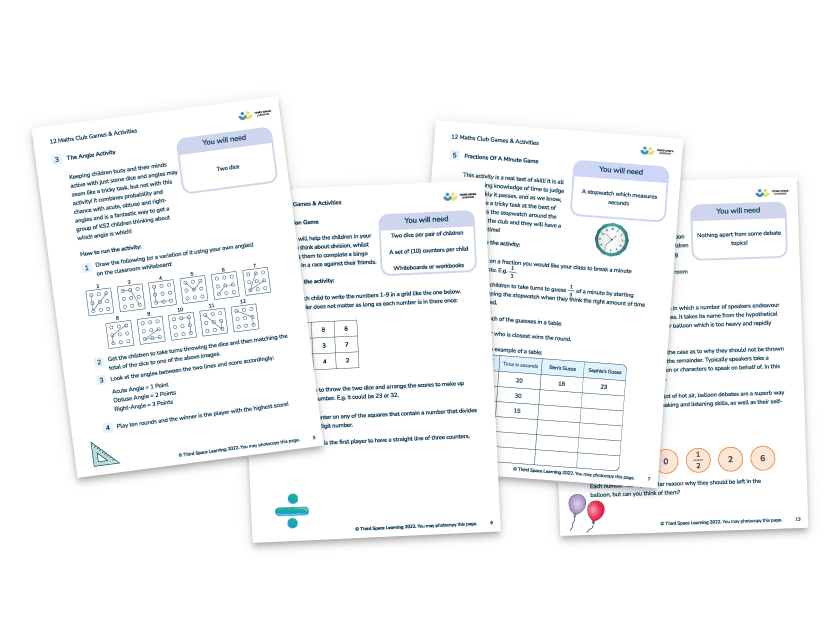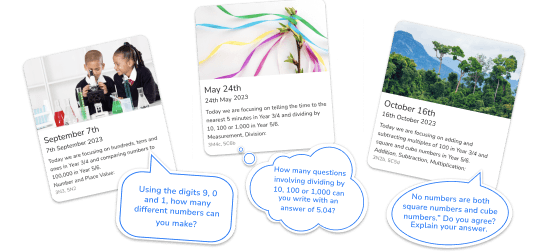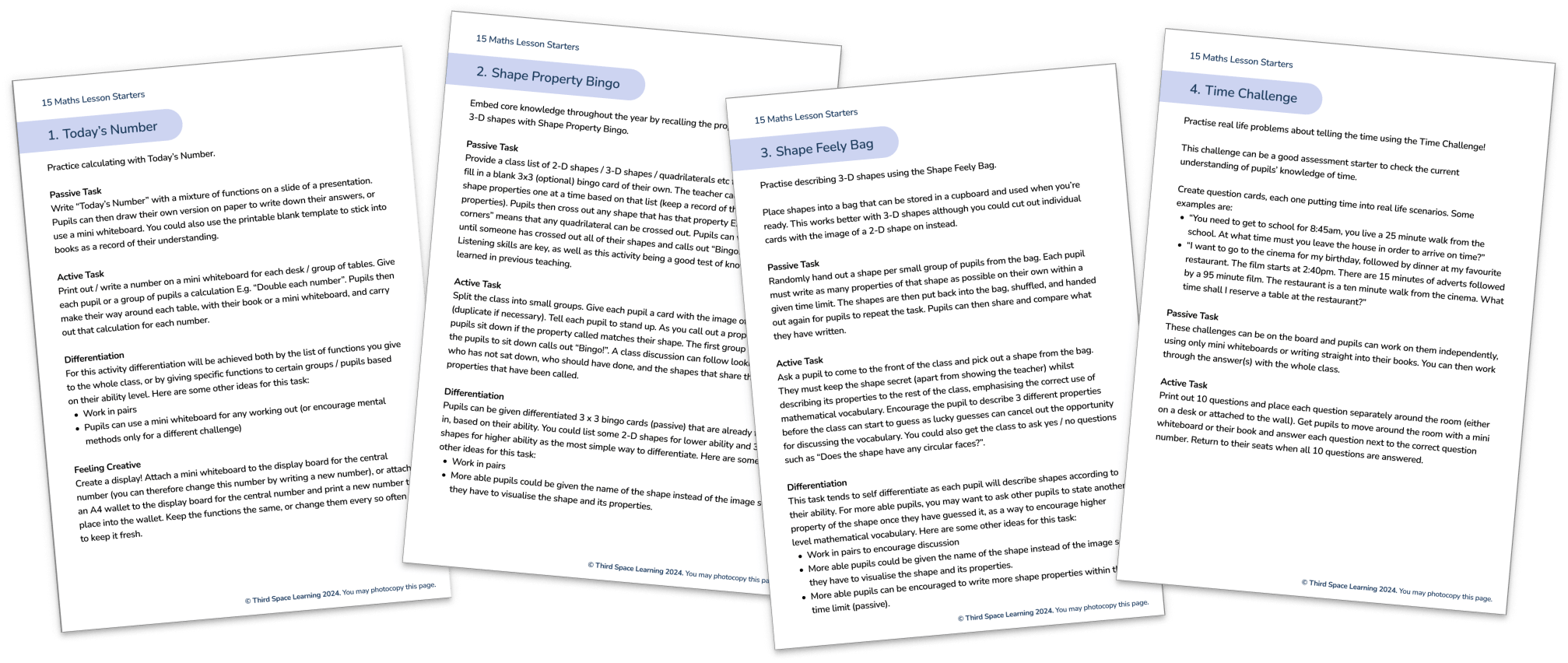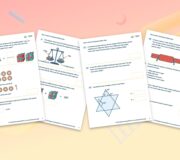365 Starter of the Day Activities And 8 Strategies for Creating Your Own Maths Starters
Starter of the day activities are essential to maths lessons across UK primary schools. As teachers, you know the first few minutes of class are an opportunity to energise young minds and set the tone for successful learning. These quick, engaging activities warm up mathematical thinking and help establish routines that make classroom management smoother.
Whether you’re teaching Year 1 or Year 6, incorporating daily starter activities can significantly boost pupil engagement and retention of key mathematical concepts. They provide essential practice in fundamental skills while making lessons dynamic and interesting. From number bonds and times tables to date-based problem solving, these brief exercises build confidence and create an atmosphere where mathematical thinking becomes second nature.
This article explores practical strategies for implementing effective starter of the day routines, along with a collection of tried-and-tested activities that you can easily adapt to your classroom. We’ll focus particularly on mathematical concepts and calendar-based challenges that will get your pupils thinking critically from the moment they step through the classroom door.
What is a starter of the day?
A “starter of the day” is an introductory activity designed to engage pupils before the main lesson begins. These activities serve as a warm-up, helping pupils reactivate their prior knowledge on a topic or activity and encourage the mindset required for the lesson ahead.
Whether it’s a quick math puzzle, a thought-provoking question, or a fun game, starters create an effective learning environment.
Such activities capture pupils’ attention and provide a structured start to the lesson, reducing downtime and increasing overall class efficiency, along with other activities.
Third Space Learning provides schools with a daily maths challenge for LKS2 and UKS2 pupils. Teachers can find a new question in the Third Space Maths Hub every day to engage learners. Find out how to use the Maths Hub with ease and all of the resources you need.
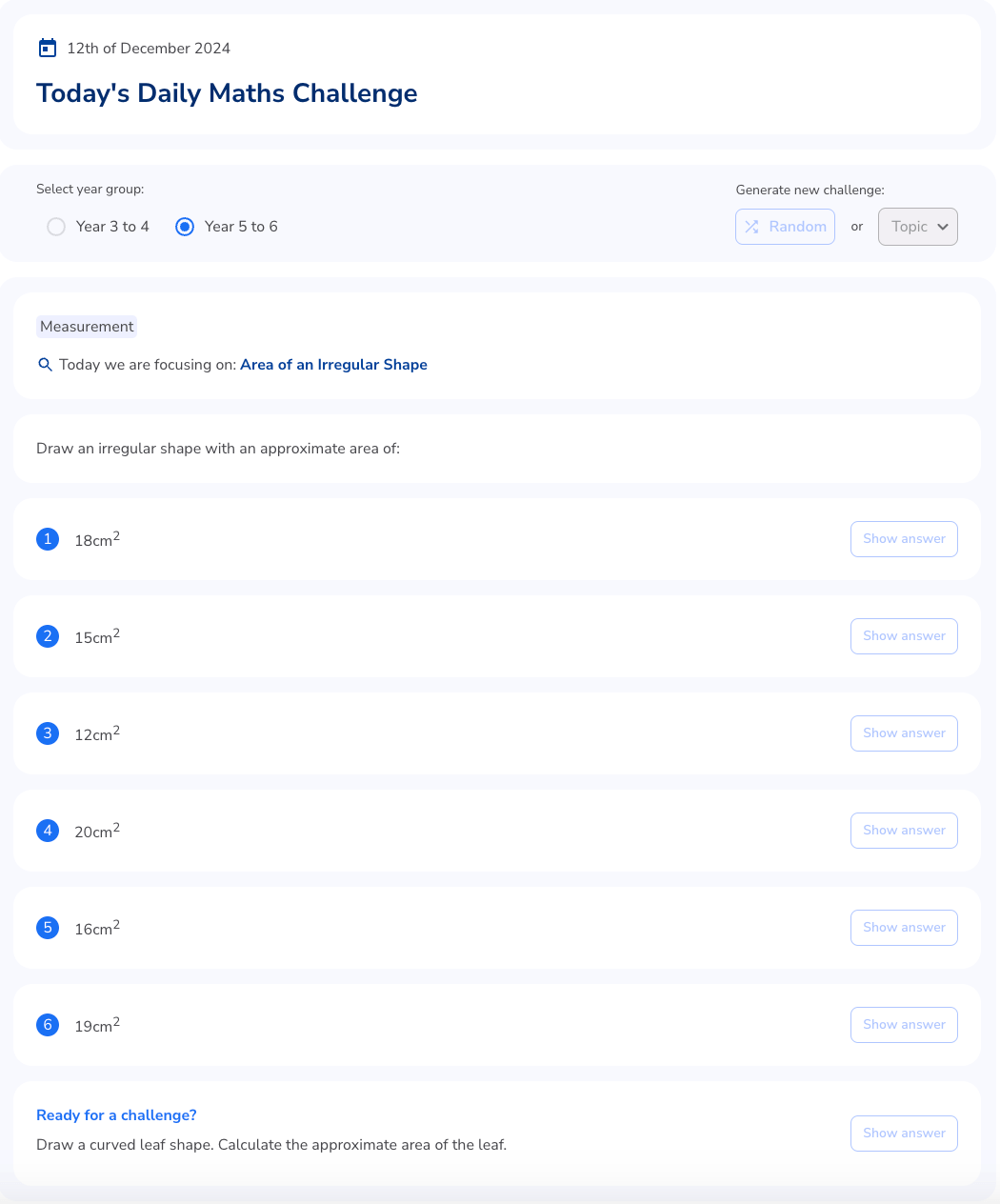
Maths Lesson Starters
15 engaging maths starters with instructions, printable resources, and differentiation tips for varied classroom use, including games and activities for enhancing pupil engagement.
Download Free Now!Cognitive science behind starter of the day
Research shows how starter activities can enhance memory retention and improve cognitive processing. It highlights the significance of working and long-term memory in enhancing teaching effectiveness. Incorporating cognitive science principles into starter activities makes learning more engaging and efficient.
Using a starter of the day is an optimal time to include teaching strategies like retrieval practice and interleaving which can significantly boost academic outcomes.
Retrieval practice, which involves recalling information, helps strengthen memory, making it easier to access information later.
Interleaving, or mixing different topics or skills, develops a conceptual understanding and better retention.
Using these strategies in starters increases the likelihood that pupils will retain and understand the material.
Additionally, starters can help manage cognitive load, enabling pupils to process information more efficiently. Techniques such as dual coding, which combines verbal and visual information, can improve memory retention and make learning more accessible.

Mathematical starters
Starters can cover a range of mathematical concepts, from basic arithmetic to more complex topics like prime numbers and factors to enhance pupils’ logical reasoning and problem-solving skills. Using these activities in maths lesson plans ensures pupils continually develop their mathematical skills and understanding.
Sudoku puzzles, for example, are excellent tools for encouraging logical reasoning and problem-solving among pupils. Additionally, math riddles can stimulate critical thinking by challenging pupils to solve problems that blend language and math skills.
Using dominoes and dice games and activities in math lessons helps pupils enjoy practising addition and multiplication. These activities reinforce mathematical concepts and make learning more enjoyable for pupils.
Calendar starters
Calendar starters are an excellent way to help pupils develop organisational skills and understand the concept of time. Implementing monthly classroom calendars can include tasks such as identifying days until key events or tracking seasonal patterns.
These activities can also create a routine that supports pupils in transitioning smoothly between different subjects and activities throughout the day.
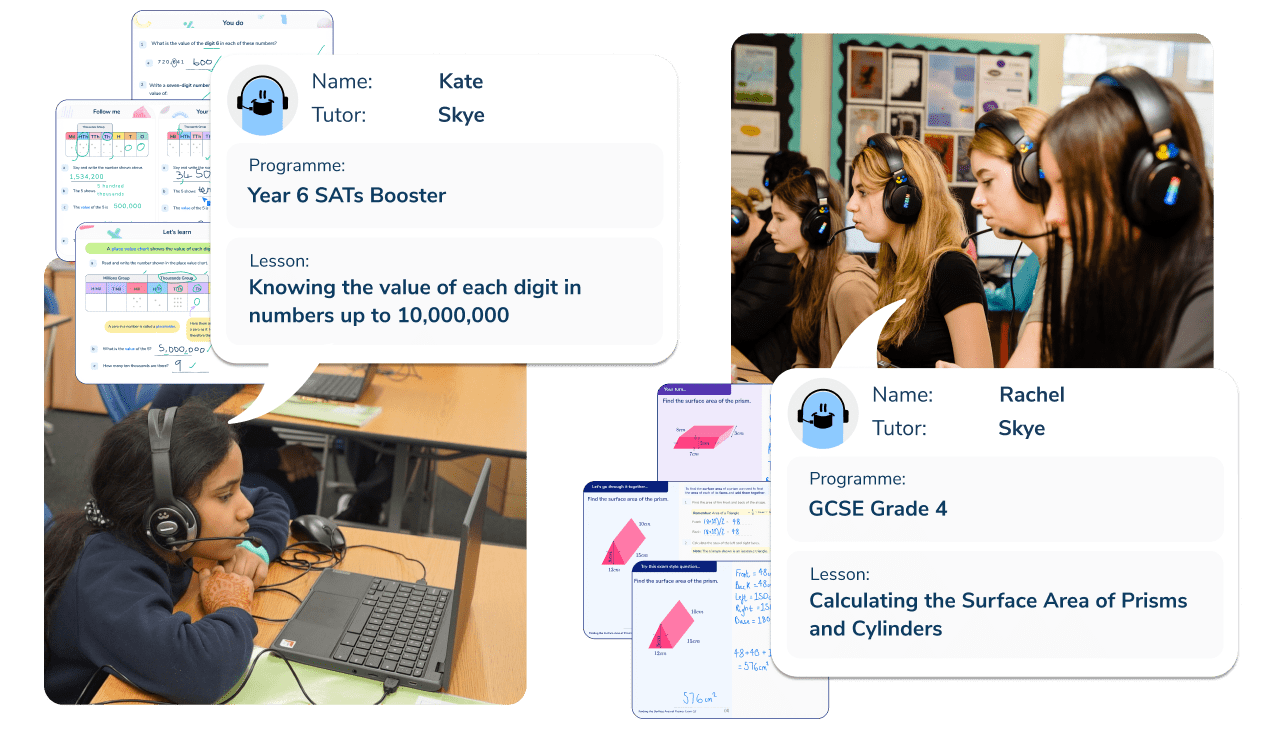
Meet Skye, the voice-based AI tutor making maths success possible for every student.
Built by teachers and maths experts, Skye uses the same pedagogy, curriculum and lesson structure as our traditional tutoring.
But, with more flexibility and a lower cost, schools can scale online maths tutoring to support every student who needs it.
Watch Skye in action5 benefits of using starter of the day
Starting each day with an engaging mathematical activity sets the foundation for successful learning in primary classrooms. Brief yet purposeful starter activities not only help transition pupils into ‘learning mode’ but also provide valuable opportunities to consolidate prior knowledge and spark creative thinking.
1. Pupil engagement
Effective starters can consolidate prior knowledge, introduce new topics, or simply provide a fun transition into the main lesson. Capturing pupils’ interest early on sets a positive tone for the rest of the lesson.
2. Helps focus attention and settling classes
Incorporating silent starters can help settle excited classes and prepare pupils for focused learning. Beginning with a stimulating activity enhances focus and attention span, making pupils more receptive to the lesson’s content. This initial engagement is crucial for maintaining a productive classroom environment.
3. Enhances problem-solving
Regular engagement with creative starters can significantly improve pupils’ creativity and problem-solving skills. These challenges not only make learning fun but also encourage pupils to think outside the box.
4. Motivates pupils
Introducing fun and challenging tasks at the beginning of the lesson can increase pupils’ motivation and enthusiasm for learning.
Starters can also address smaller curriculum areas, allowing for gradual learning without disrupting the main focus of lessons.
Maintaining student interest and motivation through starters contributes to a dynamic and effective learning environment.
5. Diagnostic assessment
Regular assessment during starter activities helps teachers understand pupils’ strengths and areas for improvement. Teachers can adapt their instruction and lesson content based on pupils’ understanding to help all learners meet the lesson objective.
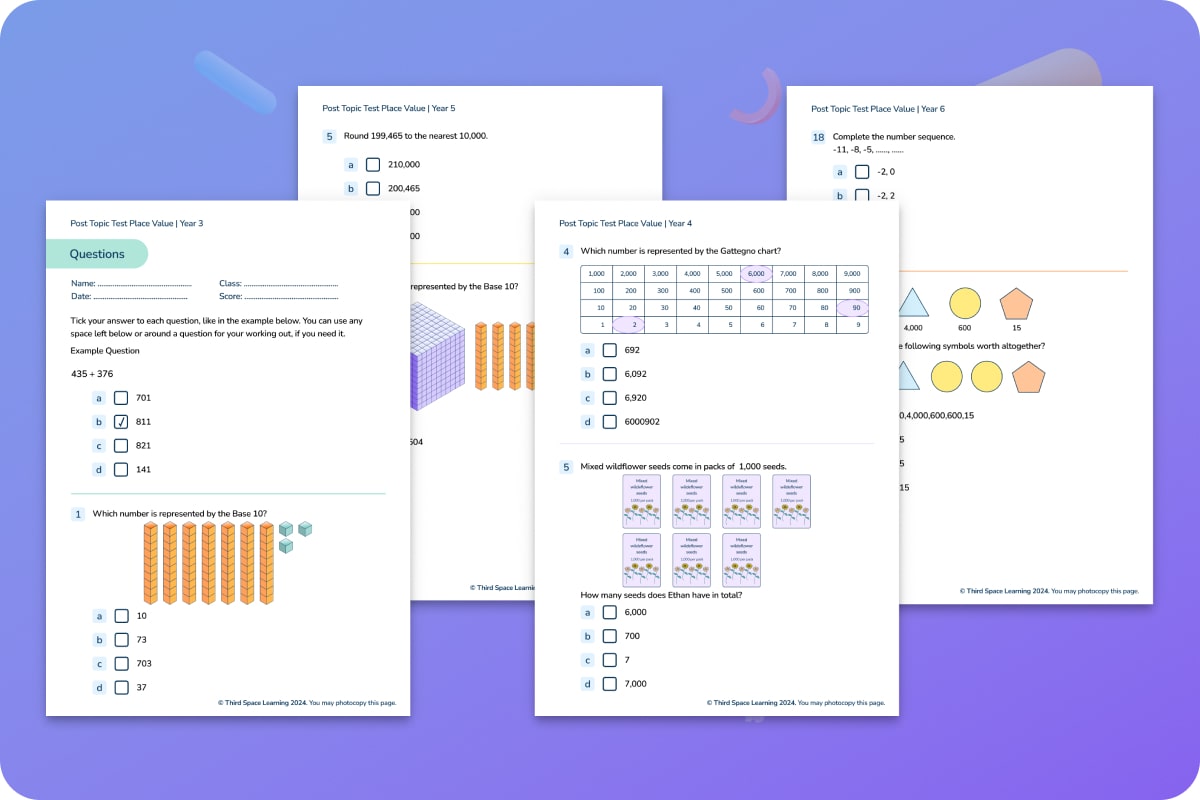
Schools can use Third Space Learning’s diagnostic question packs as a starter of the day. Either print out for each child to complete the same question at the beginning of the lesson, or display one question on the IWB to help identify pupils’ strengths and areas for development.
The diagnostic assessments on Third Space Learning’s Maths Hub are amazing.
Clare Sealy, Ex-Headteacher, St Matthias Primary, Tower Hamlets
8 strategies for effectively incorporating a starter of the day into daily lesson plans
Incorporating starters into daily maths lessons requires carefully planned strategies tailored to pupils’ abilities and mathematical understanding. Different types of maths starters, such as number puzzles, mental maths challenges, and problem-solving exercises, help to engage pupils and enhance their mathematical thinking.
When selecting mathematical starters, consider both the pupils’ current abilities and the lesson objectives. For instance, Year 1 pupils might benefit from simple number bond games and counting sequences, while Year 6 pupils could be challenged with multi-step word problems or algebraic thinking puzzles.
Here are 8 effective strategies for incorporating effective maths starters:
1. Create a weekly routine
A weekly routine can help reduce the time it takes to plan maths starters and ensure you cover key mathematical skills each week. For example, Monday may focus on times tables, Tuesday on mental maths strategies, Wednesday on shape and space concepts, Thursday on problem-solving, and Friday on number patterns.
2. Link to real-world contexts
Incorporate calendar maths by using dates, temperatures, or current events to create relevant mathematical problems. This might include calculating how many days until the next school holiday or working with temperature differences.
3. Interleave topics
Interleaving mathematical concepts in starters such as place value and geometry helps reinforce pupils’ long-term memory of key mathematical skills. This approach reinforces prior knowledge and prepares pupils for new mathematical content.
4. Implement quick-fire round
Use short, snappy activities like ‘number of the day’ where pupils find different ways to make a number through addition, subtraction, multiplication, and division, promoting mathematical fluency and flexibility in thinking.
5. Use games
Pupils love games. Games can be adapted using different dice or dominoes to practice various operations and number skills within the classroom. Adaptable resources such as Third Space Learning’s KS1 games and activities and KS2 games and activities make it easier for teachers to implement engaging numerical activities that suit their pupils’ abilities.
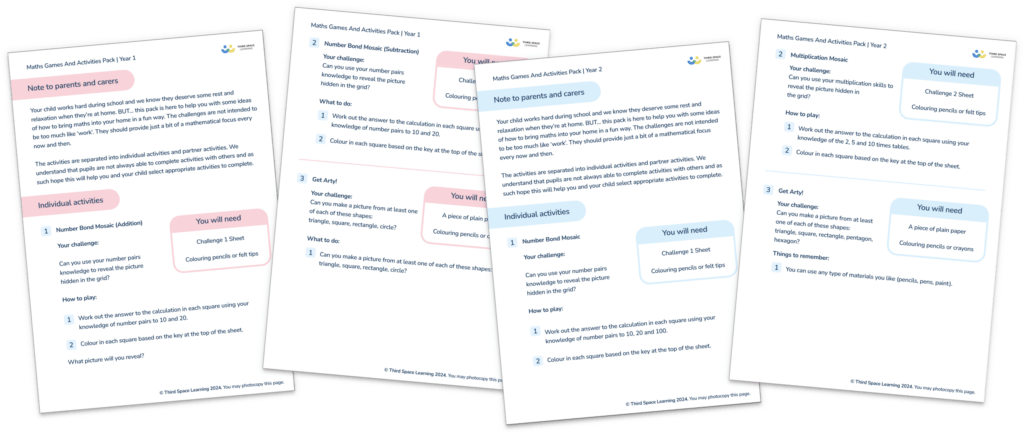
6. Customise activities
Customisable activities focusing on number bonds, times tables, or mental arithmetic can meet the varying needs of pupils while requiring minimal preparation. Resources featuring number sequences, pattern recognition, and calculation challenges offer a structured approach to mathematical starters, catering to different year groups. These maths starters can motivate pupils to engage more deeply with mathematical concepts.
7. Peer learning
Incorporate partner work where pupils can briefly discuss their strategies, encouraging mathematical vocabulary development and deeper understanding.
8. Use progressive difficulty
Begin each week with simpler concepts and gradually increase complexity. For example, start with basic fraction recognition and build up to equivalent fractions and calculations. Third Space Learning’s ready-made Fluent In Five progresses in difficulty with each question. Hundreds of schools use Fluent In Five as a daily maths starter of the day focusing on one question per day.
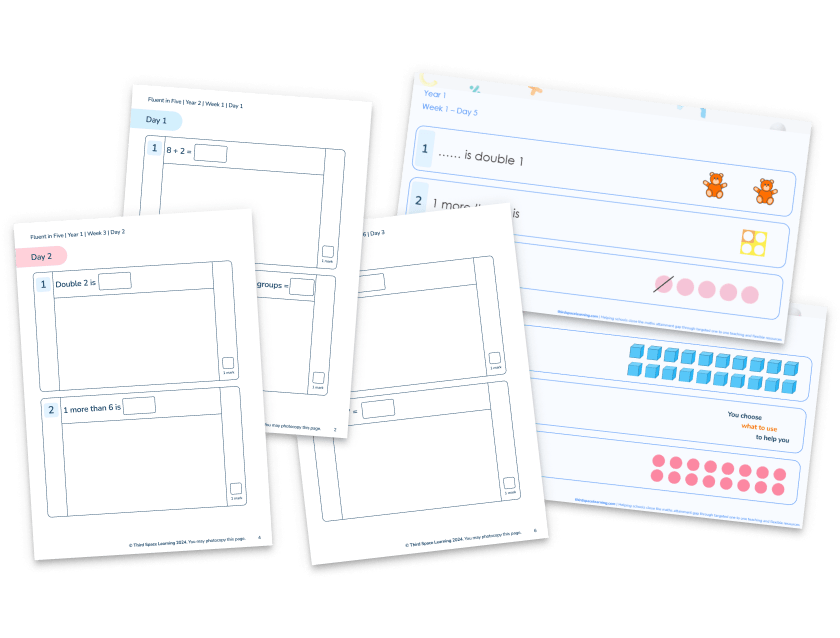
These strategies ensure starters remain engaging whilst building essential mathematical skills and confidence across the primary years.
Where to find more starter of the day activities
The Third Space Maths hub contains hundreds of free maths activities, games and assessments schools can use as starter of the day activities. Simply register with your email address to gain instant access to the plethora of adaptable resources to use with your class including:
Fluent in Five
Rapid Reasoning
Maths Code Crackers
Diagnostic Assessments
Games and Activities
Daily Maths Challenge
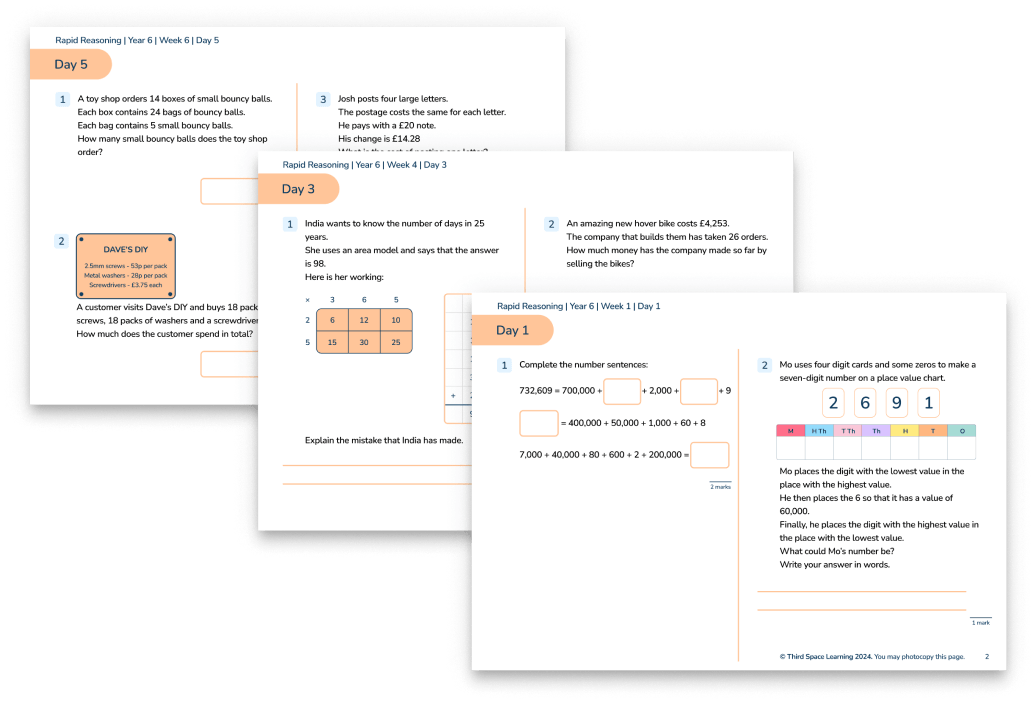
All of our resources for primary schools can be found in the Third Space Maths Hub
Create your own free Maths Hub account to access hundreds of free resources, guides and CPD videos. Premium Maths Hub access includes 36 weeks of Fluent in Five, Rapid Reasoning and Ready To Go Lesson Slides for years 1 to 6. It is available through a whole-school subscription or is included at no additional cost for schools using our online one to one maths tutoring.
Register free for the Third Space Maths Hub.
Not quite ready to register for access to hundreds of free resources? Start by downloading these activities to use as a starter of the day with your class:
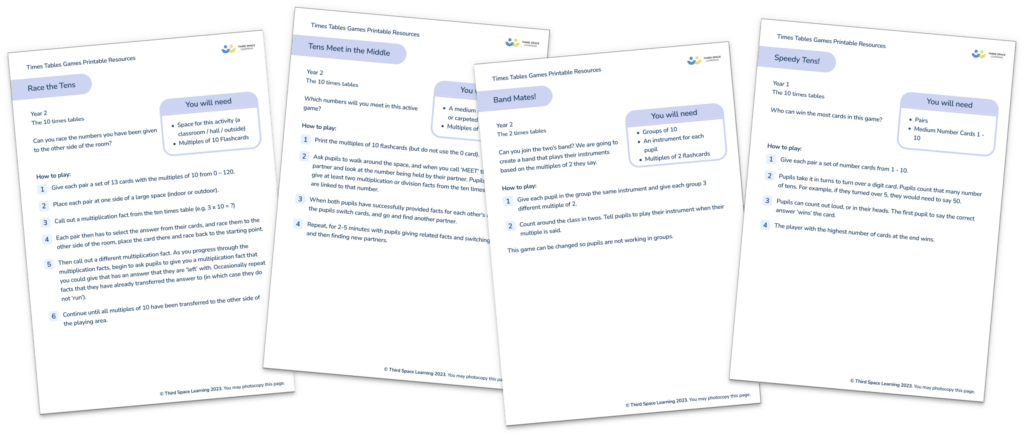
Or why not see how you can use AI maths to create your own starter of the day?
Key takeaways
Planning starters thoughtfully in advance ensures they align with lesson objectives and enhance overall classroom structure. Daily starters are crucial for enhancing memory retention by facilitating knowledge recall. Starting the day with a stimulating activity increases the likelihood that pupils will retain and understand the material.
Starters designed with learning in mind provide valuable insights for teachers about student understanding. Using targeted questions during or after starters can provide answers into student understanding and engagement, helping educators tailor their instruction to meet pupils’ needs.
Assessing the effectiveness of starters can involve observing student participation and their ability to apply concepts. Continually evaluating and refining starter activities ensures they remain engaging and effective, contributing to a dynamic and productive learning environment.
How Third Space Learning uses a starter of the day
In every one-to-one maths tutoring session, Skye, the AI maths tutor, begins with a maths starter. Pupils must answer a starter question to help activate the prior knowledge they need to access the current learning objective.
If pupils answer correctly, they continue with the planned lesson. If they answer incorrectly or have any misconceptions, Skye adapts the session to address the prior learning before moving on.
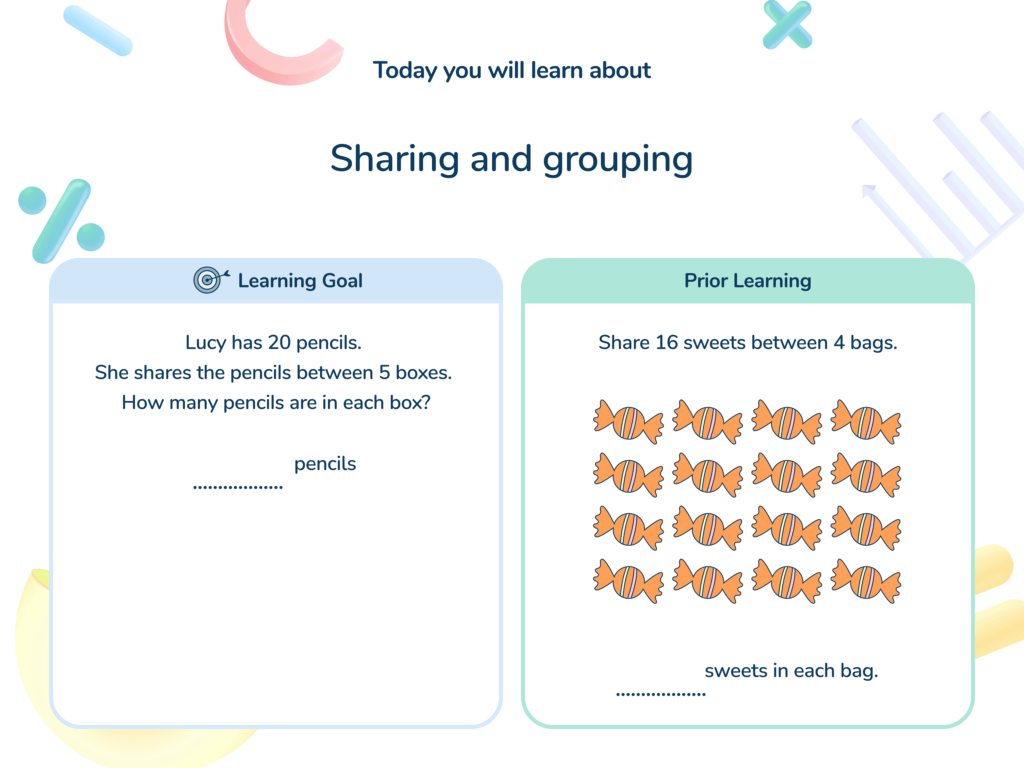
Starter of the day Frequently Asked Questions
A starter of the day is an introductory activity that engages pupils and prepares them for the main lesson, fostering a positive learning atmosphere. It effectively helps pupils transition into a focused mindset for learning.
Fun maths starters can include activities like Sudoku puzzles, math riddles, and interactive games with dominoes or dice. These activities not only engage pupils but also reinforce mathematical concepts in a fun and interactive way.
Examples of starter of the day questions include thought-provoking queries like “What is the next number in this sequence?” or “How many different ways can you solve this math problem?” These questions challenge pupils to think critically and engage with the material from the start.
There are numerous resources available online where you can find starter of the day activities for maths. Websites dedicated to educational resources often provide a variety of starters tailored to different age groups and skill levels. Third Space Learning has a whole Maths Hub dedicated to high quality maths resources that can. be used as a starter of the day activity.
